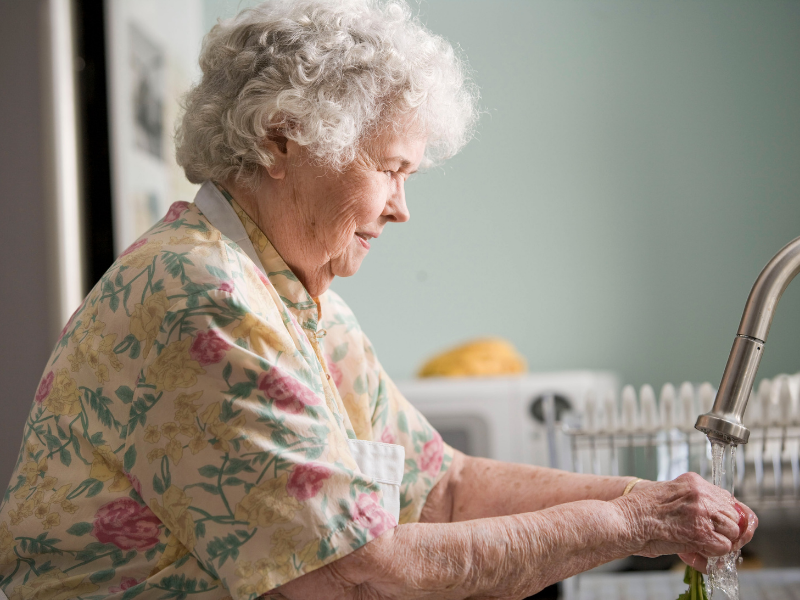Alzheimer’s disease is the most common type of dementia seen amongst the elderly population and is generally noted by signs of short-term memory loss, confusion, and difficulty completing familiar tasks.
The talented team at Vicinia Gardens is here to share some of the potential signs and symptoms of Alzheimer’s disease as well as what you can expect as it progresses. Taking on the responsibility of caring for a loved one who’s living with Alzheimer’s can be challenging and you may decide that placement in a long-term care community is right for your loved one. If so, Vicinia Gardens is here for your family. We are a long-term care campus with Independent Living, Assisted Living, Intermediate Care, and Memory Care. These communities are custom-designed for seniors. We have campuses on both the east and west sides of lower Michigan that offer safe and private accommodations for seniors requiring personalized care.
What to Expect During Alzheimer’s Stages
Alzheimer’s is a progressive & degenerative disease. However, we see these changes over time often in a non-linear progression. You can expect your loved one to have a mix of good days and not-so-good days, the important part being that we continue to meet them with kindness and understanding. This unpredictability of behavior and cognition is one of the reasons caring for an individual with Alzheimer’s can be challenging.
Stage 1: Normal Behavior
Known as the “Preclinical Stage” in research, this begins anywhere from 10 to 15 years before any symptoms appear. This stage is oftentimes described as unnoticeable. Research says you won’t notice anything unusual about your loved one, despite the fact that a number of neurological changes are occurring. This timeline notes the importance of visiting your primary care doctor regularly to detect any cognitive changes.
Stage 2: Very Basic Memory Loss
Loved ones may have periodic memory lapses or forgetfulness that’s almost impossible to differentiate from normal age-related memory issues. They may start misplacing small items or occasionally forget familiar names, but under normal circumstances, they can maintain their typical day-to-day routines. In this very early stage, Vicinia Gardens recommends Independent Living or Assisted Living depending on the amount of physical care the resident requires.
Stage 3: Noticeable Cognitive Decline
In this stage, cognitive changes become much more noticeable, both to the affected individual and those around them. This is the stage where many individuals seek assistance from a primary care physician or other medical professional. Patients with Alzheimer’s are most commonly diagnosed when their disease has progressed to this stage. During this stage, Vicinia Gardens recommends Assisted Living or Intermediate Care depending on the level of physical care the resident may require.
You may notice that your loved one:
- Has difficulty with short-term memory (not remembering what they ate, if they took a medication or when they made plans)
- Has trouble organizing their daily schedule and remembering important events
- Has an impaired ability to use correct words while speaking and/or writing
- Has increased anxiety leading to avoidance of social settings
Stage 4: Cognitive & Physical Decline
This stage involves noticing a marked progression in memory loss, as well as difficulty with organizing thoughts, making plans, and reasoning. Individuals at this stage recognize only some of the changes they are experiencing, and that can lead to anger, depression, anxiety, and aggression.
You may notice that your loved one:
- Struggles with their short-term memory on a consistent basis
- Can recall events in the past with some clarity, but may not know what day it is or where they are
- Has major difficulty managing their medications (skipping doses or accidental double-dosing)
- Has developed irregular sleep patterns, such as taking excessively long naps during the day and failing to sleep during the night
- Doesn’t dress appropriately for the weather
- Has started wandering
- May become withdrawn or depressed due to lack of understanding of environment or social situations
While medications cannot cure or completely prevent the onset of Alzheimer’s, some people with Alzheimer’s may benefit from prescription drugs to improve memory, awareness, and the ability to perform daily functions. Vicinia Gardens recommends Intermediate Care or Memory Care depending on the level of physical care the resident may require.
Stage 5: Moderately Severe Decline
Individuals likely need significant support with day-to-day activities at this stage. They are most likely unable to live without in-home or on-site support. In this stage people generally have trouble remembering close friends or even family members. Basic tasks are incredibly difficult, and there is a major struggle to recall new information.
You may notice that your loved one:
- Has difficulty remembering familiar faces and names
- Needs increased help getting dressed, using the bathroom, and brushing their teeth
- Experiences a wide range of emotions, often without provocation or warning
- Becomes fearful and/or paranoid. Hallucinations can occur unannounced
- Experiences incontinence, and may begin relieving themselves outside of an appropriate environment
If your loved one is currently experiencing a moderately severe decline, Vicinia Gardens recommends Memory Care depending on the level of physical care the resident may require.
Stage 6: Severe Decline
At this stage, your loved one will no longer be able to manage activities of daily living, such as dressing themselves, bathing, or remembering to eat or drink.
You may notice that your loved one:
- Has difficulty speaking.
- Has trouble recognizing close family members (spouse, kids, siblings).
- Is unable to orientate themselves to time and place
- Paces, fidgets, and moves objects around repetitively
- Has verbal and/or physical outbursts
- Likely needs hand-over-hand assistance to eat and drink
- Displays significant personality changes (anxiety, anger, delusions, hallucinations, etc.)
If your loved one is currently experiencing a severe decline, Vicinia Gardens recommends Memory Care depending on the level of physical care the resident may require.
Stage 7: Very Severe Decline
When loved ones reach stage seven, they usually require around-the-clock hands-on care. They may become completely mute, or if not, their vocabulary is often limited to just a few words that are difficult to understand and or consistently used out of context.
You may notice that your loved one:
- Can no longer control their facial movements
- Experiences reduced mobility (cannot walk or turn over in bed)
- Cannot hold themselves up in a seated position unless the chair has armrests
- Experiences complete incontinence
- Experiences reduced ability to eat and drink safely
- Has verbal outbursts
If your loved one is currently experiencing a very severe decline, Vicinia Gardens recommends Memory Care depending on the level of physical care the resident may require.
Benefits of Memory Care Facilities
Memory care communities feel much like assisted living communities but are designed for seniors with Alzheimer’s disease and other types of dementia. At Vicinia Gardens, our staff offers all-inclusive assistance with activities of daily living and are specially trained to help residents manage the challenges that come with Alzheimer’s and dementia. Along with a safe and secure home, we are also proud to provide a wonderful life enrichment program. With considerate care and guidance, our staff helps each resident safely manage medication, bathe, dress, and provide personal care while still maintaining a fun, home-like atmosphere.
Contact Our Michigan Memory Care Facility
Vicinia Gardens has everything your loved one will need — with an all-inclusive rate! Reach out to learn more about our memory care facilities in Fenton and Otsego, as well as our intermediate care community in Fenton that is built for residents with early- to mid-stage dementia.


